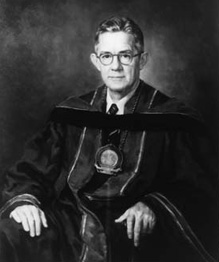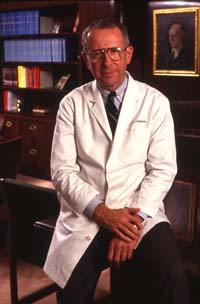 As a teenager, ALFRED BLALOCK, Med 1922, decided that he wanted to attend the School of Medicine at Johns Hopkins, where his father had been a patient. After earning a Hopkins medical degree, he trained at Vanderbilt University and then served on its full-time faculty. Dr. Blalock joined the Hopkins faculty in 1941 and went on to become one of the most highly renowned and honored surgeons of his day.
As a teenager, ALFRED BLALOCK, Med 1922, decided that he wanted to attend the School of Medicine at Johns Hopkins, where his father had been a patient. After earning a Hopkins medical degree, he trained at Vanderbilt University and then served on its full-time faculty. Dr. Blalock joined the Hopkins faculty in 1941 and went on to become one of the most highly renowned and honored surgeons of his day.
He is best known for his work on shock and for developing, with Helen Taussig and Vivien Thomas, the operation for the Tetralogy of Fallot–known as the “blue-baby operation”–a procedure that palliates a congenital malformation of the heart. In 1953, Dr. Blalock was honored with the American Medical Association’s Distinguished Service Award for his outstanding work in surgery. He died in 1964.
